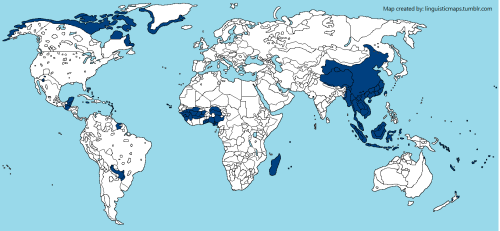#inuktitut
Tenseless languages
Language that do not possess the grammatical category of “tense”, although obviously, they can communicate about past or future situations, but they do it resorting to adverbs (earlier, yesterday, tomorrow), the context (pragmatics), but mostly aspect markers, that show how a situation relates to the timeline (perfective, continuous, etc.) or modal markers (obligation, need, orders, hipothesis, etc.)
Tenseless languages are mostly analytic/isolating, but some are not. They occur mainly in East and Southeast Asia (Sino-Tibetan, Austroasiatic, Austronesian, Kra-Dai, Hmong-Mien), Oceania, Dyirbal (in NE Australia), Malagasy, Yoruba, Igbo, Hausa, Ewe, Fon and many Mande languages of Western Africa, most creole languages, Guarani, Mayan languages, Hopi, some Uto-Aztecan languages, and Greenlandic and other Inuit dialects.
Post link
[ID:
Video opens up to uncut beluga meat on a wooden cutting board, gently zooming in with an ulu at the side. It zooms out to show soy sauce collected in a white with red rimmed bowl. Another person slowly starts cutting off the raw beluga fat from the beluga skin
“Yes, this is beluga. Our favorite traditional meal, called mattak. We eat it with soy sauce, and we use this traditional knife called ulu.”
“We cut off the fat. We make sure to cut it in small pieces because it’s hard to chew, it has a rubbery texture.”
Video shows the beluga meat being diced, still connected to the skin. Person dips the mattak into soy sauce and eats it.
The person recording holds up a big and thin piece of dried caribou, turning the camera to themself as they eat it.
“And this is dried caribou, called nikkuk. It’s delicious. All of these animals are hunted by our people, family, friends, and we feed to the whole community so it’s completely—“
The audio cuts off with white text clarifying, “The animals lived a happy natural life, we do not waste any part of the animal. We need to STOP the stereotypes of this being “cruel” and “inhumane”. This is the best way to hunt food.“
Screen switches to the Tik Toker’s name and username, Shina Nova / @shinanova
END]
Tânisi! Aiguuq! Aaniin!
The 21st of July is National Aboriginal Day in Canada and this is how you say hello in the three most widely spoken languages and dialect groups of native Canadians or “First Nations”. These are Cree,Inuktitut(language of the Inuit/”Eskimo”) and Ojibwa.
The stop sign above from Quebec is written in Canada’s two national languages and Cree.
Post link


